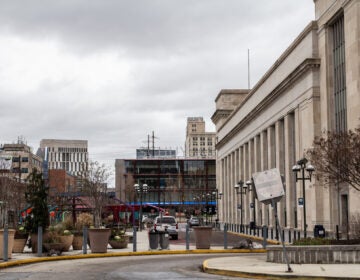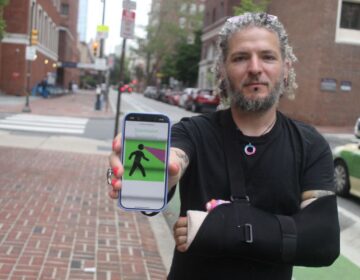DeLissio: ‘I have the ideas, energy and skills set’ to be the 194th District’s next State Rep.
This November, Democratic incumbent Pamela DeLissio will face off against Republican opponent Linda Wolfe-Bateman in the race for Pennsylvania’s 194th District State Representative seat, which covers portions of Montgomery County and much of Northwest Philadelphia. NewsWorks contributor Erin Cusack sat down with the two candidates to learn more about their positions on some of the most pressing issues facing the state. See what they had to say about health care, jobs and the economy, and the future of public education in our state.
This is the first in a series of two articles. Today we hear from Rep. Pamela DeLissio. Linda Wolfe-Bateman’s piece will publish tomorrow.
Background: What experience, expertise and ideas do you bring to elected office?
DeLissio: I spent the first 20 years of my career heading up two non-profit retirement communities that served lower-income older adults. I’ve always been interested in the needs of older adults, and have followed the older adult demographics in Pennsylvania since 1978. Ten years ago I started a consulting practice, and in 2003 I bought a small technology company. This experience in the non-profit sector and as a small business has served me well every hour of every day as a Representative. When legislation is being discussed in committee or on the floor, the depth and breadth of this background allows me to understand the nuances of public policy.
Health: In June, the Supreme Court upheld the constitutionality of the Affordable Care Act. What is your stance on health reform? And how will you move forward in implementing it in a way that’s best for Pennsylvanians?
DeLissio: Trying to help my colleagues understand the benefits of having Pennsylvanians insured is what I need to be busiest about. Right now there’s legislation being circulated that would prohibit the Medicaid expansion in Pennsylvania (since states can opt out) and defund the State Health Insurance Exchange, which I find very dismaying. The real work is having a dialogue with constituents and giving them the chance to weigh in, as well as explaining to my colleagues the benefits of having insured Pennsylvanians who are not entering the emergency room at the most expensive level of care. My goal is to work in a bi-partisan way to help people understand what we need to do and where the middle road is to make things happen.
Economy: Pennsylvania’s unemployment rate stands at 8.1 percent, right around the national average. Additionally, the public sector in Pennsylvania shed 22,700 jobs from December 2010 to December 2011. What plans do you have to invest in jobs and incentivize business growth?
DeLissio: I think we hear a lot of talk about “is business confident?” or “are people paralyzed?”, but in a way we’re telling them to be paralyzed; it’s all about the message we put out there to the public. The way I try to help at home is by introducing people, organizations, and businesses in my district and making connections where there may be synergy or an opportunity to work together. From a policy standpoint, we have 20,000 job openings in Southeastern Pennsylvania, but we do not have an appropriately trained workforce to apply for and fill those jobs. We need to ensure that community colleges, which respond to workforce changes and demands more nimbly than other higher education institutions, have adequate funding to continue to deliver their product of a qualified workforce.
Taxes: Voters have heard a lot about “no new taxes” pledges, and the countervailing call to action to close tax loopholes. What ideas do you have for generating new revenue for the state, whether it be through tax cuts or increases?
DeLissio: The fact that Governor Corbett signed a pledge for no taxes under any circumstances, even before he took office, was very troubling to me. There is revenue sitting on the table that we’re missing out on. For example Pennsylvania’s Sales Tax Vendor Discount program only requires businesses to remit 99 percent of their sales tax. As a former business owner, I had to pay this tax and can tell you that this 1 percent in savings is not necessary to compensate for the cost of filing. If we were to pick up this 1 percent, conservatively we would be able to generate $75 million. Do you know how many programs that if offered a slice of this $75 million might be able to achieve their goals and mission?
Education: Funding for education continues to be threatened in these tough economic times. What are your priorities for funding education in Pennsylvania? And where do you stand in the school choice vs. public education debate?
DeLissio: Our state seems to have adopted the Popeye and Wimpy attitude of “I’ll pay you tomorrow for a hamburger today.” We are so concerned about saving money that we don’t think about the collateral damage and consequences along the way. With the example of early childhood education, I think every child should have the opportunity to be in a quality pre-school and pre-K learning environment. As far as school choice, I have spent a lot of time with voucher proponents trying to understand how this is good public policy, and their answer is that it gives people hope. Giving people hope, though, is not the point of public policy. The purpose of public policy is to create a quality, consistent product that is available and accessible to all of our citizens. In my opinion, voucher legislation that diverts public funds to private schools is not the intended use of taxpayer dollars.
Social Issues: What are some of the social issues that define your campaign platform?
DeLissio: I am a founding member of the LGBT caucus, and proud of it. One day when I was addressing the 253-person General Assembly, I asked the question “what are the chances that someone in this room is not a member of the LGBT community?” I respect people’s opinions, but we have to make sure we are not violating other people’s rights based on our respective opinions of what is and is not appropriate. For example, we have no state law protecting someone from being discharged from work indiscriminately based on sexual orientation. Things like this need to change in our Commonwealth.
Make a last pitch to voters in your district. Why should they vote for you?
DeLissio: I have the ideas, the energy, and the skills set to consensus build, represent their voices, and build bridges. I have 100 percent attendance on the floor in caucus and in committee, which not every member can say. The fact that I held 14 town halls in 18 months is evidence that dialogue is important to me. I have all of the credentials to represent my constituents in Harrisburg, and my commitment is to continue to use those skills to put in place the best possible public policy and to prevent bad public policy from happening.
Check NewsWorks tomorrow to hear Linda Wolf-Bateman’s responses to these questions.
WHYY is your source for fact-based, in-depth journalism and information. As a nonprofit organization, we rely on financial support from readers like you. Please give today.




